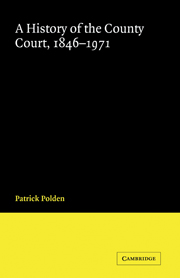Book contents
- Frontmatter
- Contents
- Acknowledgements
- List of abbreviations
- Table of cases
- Table of statutes
- Introduction
- 1 The making of the new county courts
- 2 An age of expansion, 1847–1870
- 3 An age of frustration, 1871–1914
- 4 War to war
- 5 ‘Patching up the courts’
- 6 Central organisation and finances
- 7 Judges
- 8 Staff and buildings
- Appendixes
- 1 The Mayor's and City of London Courts
- 2 County court towns, 1847–1971
- 3 Statistical tables
- Bibliography
- Index
1 - The Mayor's and City of London Courts
Published online by Cambridge University Press: 06 September 2009
- Frontmatter
- Contents
- Acknowledgements
- List of abbreviations
- Table of cases
- Table of statutes
- Introduction
- 1 The making of the new county courts
- 2 An age of expansion, 1847–1870
- 3 An age of frustration, 1871–1914
- 4 War to war
- 5 ‘Patching up the courts’
- 6 Central organisation and finances
- 7 Judges
- 8 Staff and buildings
- Appendixes
- 1 The Mayor's and City of London Courts
- 2 County court towns, 1847–1971
- 3 Statistical tables
- Bibliography
- Index
Summary
In the scheme for a nationwide network of county courts there was one glaring omission – the City of London. Evidently the corporation had used its formidable political influence to secure the right to make its own arrangements.
Apart from the Palace Court, which was soon to be abolished, there were two ancient but active courts in the City, the Mayor's Court and the Sheriffs' Court. The Sheriffs' Court had jurisdiction over debt and personal actions at common law arising within the City and its liberties and adopted the pleadings and procedures of the superior courts. In 1835 the City had also submitted to the fashion for courts of requests and in 1846 substituted a small debts court modelled on the new county courts. In 1852, through a further local Act, this became the City of London Small Debts Court, presided over by the judge of the Sheriffs' Court, which remained in existence but ceased to perform any functions. The Small Debts Court obtained the same enlarged jurisdiction as the county courts and, perhaps due to the lack of effective scrutiny of local bills, it also obtained some powers which they did not possess.
The judge was elected by the corporation and William Arabin, celebrated for his legal malapropisms, was followed first by the highly esteemed Russell Gurney and then by the mediocre Michael Prendergast. On Prendergast's death in 1859 there was a stirring contest, finally won by Robert Malcolm Kerr on a vote of 102 to 100.
- Type
- Chapter
- Information
- A History of the County Court, 1846–1971 , pp. 322 - 325Publisher: Cambridge University PressPrint publication year: 1999
- 1
- Cited by



